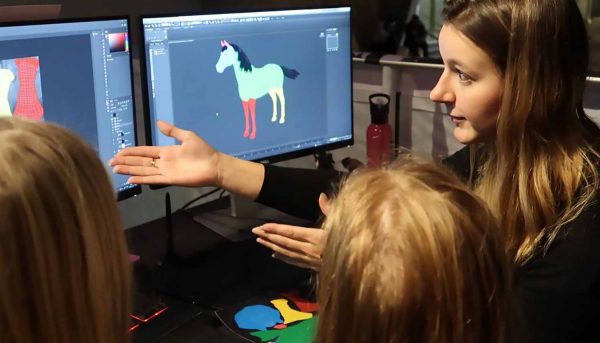Careers in the video game industry are highly desirable, and for good reason. Working for a video game company can be rewarding, and equally important, turns a favorite pastime into an exciting career. However, for tween and teen girl gamers, the prospect of one day working in the video game industry may seem daunting. While 46% of the U.S. gamer population is female, women account for only 22% of video game developers.
Women are taking the reins developing, designing and marketing video games. Lisa Wackenhuth Svanström, a 3D Artist at Star Stable Entertainment, a multiplayer game full of horses, magic and adventure, offers career advice to young women who may want a career in the video game industry:
1. What inspired you to build a career in the video game industry?
I am a life-long gamer, artist and digital creator and now, my official title at Star Stable is 3D Artist. Working for a company like this allows me to unite my interests and skills to create magic for girl gamers around the world. The artistic process of designing the 3D horses inspires me the most. It is so rewarding to have an idea in my mind, sketch out a new design and work with all the visuals such as 3D models, characters, textures, environments, props and ultimately release the final product for horse-loving girls who play our game every day.
2. What are the types of jobs for women in the development studio?
To build a game, artists (3D, 2D, VFX and animators), designers and programmers need to work closely together from start to finish. Artists work on the overall creative vision. Designers work with the mechanics and features. Then, programmers use their coding knowledge to bring it all to life. We work with producers to make sure that all tasks associated with the development process are completed on time and tracking with the overall vision of the project. As the industry continues to grow and evolve, developers focused on mobile and virtual/mixed reality are in high demand, as are tech animators, who use a combination of creative and animation skills to solve issues related to art production.
3. What other types of jobs do women have in the industry outside the development studio?
I have built my career in game art, but it takes dozens of people with specific skillsets for a video game company to succeed. Community managers interact with players daily to ensure they are having a positive experience with the game and make sure fan feedback is implemented. We also have women running the business at the executive level and as product managers and business developers. There are multiple opportunities, inside and out of the development studio, so you must embrace your skills and interests to find which career path you would enjoy most.
4. What are the most important skills needed to succeed?
I recommend that budding video game developers find a network, get to know different game engines, become familiar with 2D and 3D software, and try new games all the time. Then, become a specialist in the aspect that interests you the most. Developing specific skills is important but developing into a well-rounded person with a broad view of the world is equally important. It is also good to dive into sports, learn the arts, take a computer class or explore theater. Never stop learning and challenging yourself.
5. What advice do you have for young girls who want a career in video games?
A career in the video game industry, perhaps born out of a hobby or passion, is legitimate and can be profitable too. Today, there are dedicated game developing programs at universities. And, whether a teen dreaming of a future career, a university student or already in a career, finding a role model is key. I am fortunate to work with smart, talented women across all disciplines in the business of video games, each of whom bring something different to the table. Seek opinions from colleagues or bosses who have different work than yours — find a marketer, back-end programmer or member of the executive team and learn from them.
It’s also important to find a company that embraces women in all roles and embodies a culture of inclusivity and accessibility — the Star Stable team is more than 50% women. Finally, give back. If every woman who is part of the 22% proactively mentors other young women, imagine the next generation who will one day grow up to become our colleagues!


